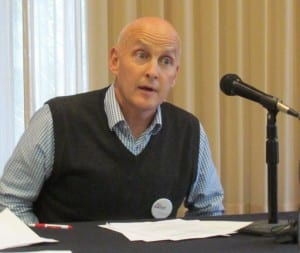Looking back on 2014, water clearly made the biggest splash in Ketchikan, followed closely by the borough’s education funding victory.
As the year began, the City of Ketchikan was ending a decade-long project: a new water-treatment system that uses chloramine – a combination of chlorine and ammonia – rather than just chlorine. That new system was built in response to increasingly stringent federal regulations related to byproducts that form in chlorine-treated water.
But, a vocal group of city residents objected strongly to the use of chloramine. They say it produces dangerous byproducts, as well, although those byproducts are not regulated by the federal Environmental Protection Agency.
United Citizens for Better Water organizers brought up Bob Bowcock – a water specialist who works with national consumer advocate Erin Brokovich – to give public presentations about chloramine-treated water, and he talked about those unregulated byproducts.
“There are thousands of studies that tell you how bad chloramines are, but the EPA hasn’t
had time to look at them,” he told a crowd at the Ted Ferry Civic Center. “So in the next generation or two, they might get around to it, and then they’ll be regulated disinfection byproducts. But until then, they’ll tell you chloramines are safe because none of the byproducts are regulated.”
A state water and wastewater consultant out of Fairbanks had a different opinion, though. Mike Pollen told city officials during a public meeting that Bowcock’s information was “subfactual.” Pollen noted that about 65 million Americans use chloramine-treated water.
“The vast majority of those people are not dropping dead on the streets from chloramines, I’m here to tell you,” he told the Ketchikan City Council “The bottom line is, EPA has continues, along with AWWA (American Water Works Association), to recommend this particular technology as an alternative for a secondary disinfectant.”
The local anti-chloramine group was not swayed by Pollen, though. Members unsuccessfully petitioned the city to halt plans to turn on the new system. So, the group started a ballot proposition effort, collecting signatures to put the issue in front of city voters. Members gathered more than enough valid signatures, but the city’s attorney later ruled that the ballot language wasn’t valid.
The new system has been operating since April 7, but hasn’t completely solved the byproducts problem.
The city is working with engineers to design a $1.7 million tweak in hopes of getting byproduct levels below regulatory standards. The city also needs to find a solution to a different water problem – too much coliform in the pre-treated water supply.
Because of those ongoing issues, the EPA and state Department of Environmental Conservation have issued a compliance order that the city must adhere to, or face building a new, expensive water filtration plant.
Another big story this year was a legal victory for the Ketchikan Gateway Borough in its
fight against the state’s education funding formula. While the Borough Assembly has been talking about potentially suing the state for a few years, it wasn’t until January that it actually filed the lawsuit in Superior Court.
On June 2, oral arguments were heard by Superior Court Judge William Carey. He took a few months to consider the issues, and in late November, ruled partly in the borough’s favor. His opinion calls the local contribution a tax earmarked for a special purpose, which Carey said violates the Alaska Constitution.
Borough Manager Dan Bockhorst quietly announced the victory during a regular Ketchikan Gateway Borough Assembly meeting, and was good-naturedly chided by Assembly Member Glenn Thompson for his seeming lack of enthusiasm.
“You should stand up, take a bow, do a jig, do something rather than just calmly report that, ‘Yeah, we won,’” Thompson said.
In his ruling, Carey denied the Ketchikan’s borough’s request for a refund of past education payments. The borough has appealed that part of the ruling, and a decision on that motion is pending.

Recently elected House District 36 Rep. Dan Ortiz speaks during a Ketchikan Chamber of Commerce event.
Also in 2014: Ketchikan’s Dan Ortiz became the new House District 36 representative; the Prince of Wales Island Community Advisory Council continued work on a borough formation charter; the Sourdough Bar went smoke free; the Big Thorne Timber Sale was approved, but then halted due to lawsuits; the carnival came to Ketchikan for the first time in 30 years; the Alaska Supreme Court heard a real case in front of local high school students; and Vigor Alaska’s Ketchikan shipyard won the contract to build two new ferries for the State of Alaska.









